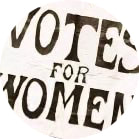|
The arrest record being alphabetically organised gives a fascinating snapshot of the movement for women’s votes. Even these few dispel the myth of London middle class centric. The women come from Scotland, the northeast, the north-west and London, they are socialists, mill workers, well educated, married, unmarried. In other words, from all walks of life and social classes. Amongst them, the list of “A”s is topped and tailed by a man.
Helen Atkinson was arrested on 28 November 1911 charged with obstructing the police during the breaking of windows. She was sentenced to a fine of 5 shillings or five days in prison. In 1913 Keir Hardie, the first Labour member of Parliament gave a speech at Rusholme, Manchester supporting the right of women to take militant action to further their cause. Four suffragettes, including Helen, wrote to him thanking him for his support and urging members of his party to take militant action for then the government would have no choice but to listen. Helen was baptised Helen Agnes and was born in Manchester in 1873 the daughter of John Bernard and Mallie Atkinson. She was the second eldest of six children. The youngest, Lucy, was born in 1885 and very soon afterwards, Mallie died. By the census in 1891, the family had moved south to Stoke Newington, north London. John describes himself as an author and journalist. Two years later he gave evidence in a trial at the Old Bailey and was stated to be the owner of a publication called the Journalist. By the 1901 census, Helen is earning her living as a shorthand typist. Although she was only arrested once she was active in the movement throughout its activities staying in touch with fellow suffragettes. She died in 1955 on the way to visit her youngest sister in hospital. Jane Atkinson was arrested in March 1907, November 1910 and November 1911. Jane was from Newcastle upon Tyne and was arrested the first time for attempting to gain entry to the House of Commons. Found guilty, she was fined 20 shillings or fourteen days in prison. On the second occasion the charges were dismissed due to a lack of evidence.For her third arrest and charges of obstruction, she was sentenced to fourteen days imprisonment. She was a member of the Newcastle WSPU being part of their delegation to Herbert Samuel, a member of the Liberal cabinet. Although it did not change the government view, Herbert Samuel did himself, in time, support women’s suffrage. The records note Jane was a married woman from Newcastle upon Tyne, aged about fifty-eight. There the trail goes cold. Mary Aves was arrested in March 1907 for her part in an attempt to enter the House of Commons alongside Jane Atkinson. The newspaper report states that she is from Chelmsford, the official records mention Edinburgh, but no other details have been located. She received the same sentence as Jane, a fine of 20 shillings or fourteen days in prison. Barbara Gould Ayerton was arrested on 7 March 1912. This record should actually read Barbara Gould Ayerton. Barbara is well documented for example at http://spartacus-educational.com/Wgould.htm. James Aylward was arrested in October 1908, one of fourteen men charged with either obstructing or assaulting the police. Events started at Caxton Hall where the WSPU were holding a meeting with entry by ticket only. A group of men gate crashed, the police doing nothing to stop them. Only after pleas from the platform did the men leave. After addressing the audience, the women left to walk to the House of Commons. Along the route, there was a considerable police presence, some on horseback. The numbers were swelled by members of the public who had either come to lend support or view the spectacle. One suffragette, Mrs Travers Symons, private secretary to Keir Hardie, succeeded in entering the House of Commons where MPs were debating the Children’s Bill. This success she managed by subterfuge arranging to meet an MP and then giving him the slip. She was swiftly ejected from the building. On the corner of Westminster Bridge, a vast crowd, gathered kept back by mounted police officers. One newspaper suggests that the crowd around the bridge and up Whitehall was over twenty-five thousand. James was charged with obstruction and bound over to keep the peace for a year with a £5 fine.
0 Comments
Leave a Reply. |
Categories
All
|
Proudly powered by Weebly


 RSS Feed
RSS Feed
